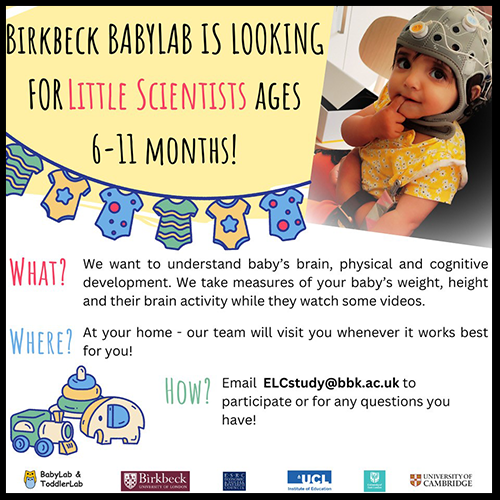Welcome to the Early Life Cohort Feasibility Study at Birkbeck's BabyLab! A new pilot research project focused on understanding brain, cognitive, and physical development of babies.
We are looking for little scientists aged 6 to 11 months to participate in our study, from the comfort of their own homes!
Would you like to participate?
Or if you have questions and want more information,
please email ELCstudy@bbk.ac.uk

With this study, we want to test the best methods to do a UK-wide study of babies’ development. The pilot study, conducted in partnership with University College of London, University of East London, University of Cambridge, and the field research agency Ipsos, will take place in participants' homes! That´s right, we want to see how doable it is to do a broad test of child development in the baby´s home and not in a lab.
In addition to the typical measurements done on babies like weight, length, body fat, head circumference, and heartrate activity, we're going deeper into baby development. We'll be recording their adorable babble to study language development, taking hair samples to examine stress levels, recording their physical activity, and using sensors like electroencephalogram (EEG) and eye-tracking to look at their attention and cognitive and social development. It's all about getting a comprehensive picture of how babies grow and thrive across the nation!
During the home visit, our friendly research partner team IPSOS will conduct various measurements using child-friendly techniques that we have used in our labs for many decades. We'll use wearable monitors, soft caps to measure brain activity while your little one is watching baby-friendly videos, and specialised tools for physical measures. We are going to ask parents to record their baby's natural language environment at home with a small audio recording device. Plus, we'll have some pre-visit questionnaires to gather additional information on sleep, your family background and your baby’s temperament.
This study will contribute to our understanding of early child development, helping shape future policies and practices, and advance knowledge of neurodevelopmental conditions. This study is funded by the Economic and Social Research Council.
